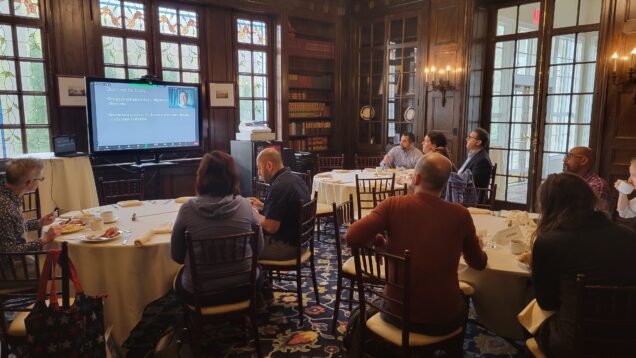Program Description, Target Audience and Curriculum

The CARE Faculty Scholars Program consists of an in-person four-day immersion training experience, as well as six virtual 90-minute ECHO® Learning Collaborative sessions.
This program aims to equip participants with the tools needed to create, implement, and evaluate addiction medicine curricula through completion of a year-long Addiction Medicine Enhancement Project.
The target audience for the CARE Faculty Scholars Program is residency program and medical school leadership and core faculty responsible for both providing care to patients with addiction and instructing trainees in fields such as internal medicine (including subspecialties), family medicine, pediatrics, OB/GYN, psychiatry, and emergency medicine.
Scholars will be encouraged to recruit 1-3 additional supporting faculty who will participate in the ECHO® Learning Collaborative sessions which occur after the immersion training experience. While the CARE Faculty Scholar opportunity is limited to faculty who are physicians, additional supporting faculty may be from a broad spectrum of professions.
Program Objectives
- Recall addiction medicine foundational science and clinical innovations;
- Assess opportunities for improving teaching and/or clinical service in your program;
- Create, implement and evaluate an Addiction Medicine Enhancement Project.
In-Person Immersion Training Curriculum
Scholars are required to attend the entire four-day in-person immersion training which covers important advances in the field of clinical addiction medicine presented through lectures, case based discussions, small group and skills practice sessions, visits to mutual support groups, and small group meetings with individuals in recovery. Each Scholar will meet one-on-one with course faculty to develop their Addiction Medicine Enhancement Project.
The curriculum includes the following:
Curriculum Development
- Needs assessment, learning objectives, and designing your curriculum
Addiction Science
- Epidemiology and neurobiology
- Pharmacology of drugs and alcohol
- Substance-related health conditions
- Impact of drugs on racially and ethnically minoritized populations
Clinical Practice
- Screening, assessment, and brief intervention
- Motivational interviewing
- Treatment approaches (e.g., pharmacotherapy)
- Relapse prevention
- Pain management in patients with a substance use disorder
- Safer opioid prescribing for pain
- Optimizing safety in people who use substances
- Overdose education and naloxone distribution
- Criminal justice involvement and health impacts
Virtual ECHO Session Curriculum
Scholars and their supporting faculty will participate in the six 90-minute ECHO® (Extension for Community Healthcare Outcomes) sessions following the immersion training which consist of core content lectures and participant Addiction Medicine Enhancement Project progress reports. Participants will receive peer and expert faculty recommendations as the project is developed, implemented, and evaluated.
The virtual curriculum includes the following:
- Fitting curriculum development into your schedule
- Developing your pre-survey/baseline assessment
- Advanced survey/ assessment design
- Basic quantitative analysis
- Cognitive load theory
- Interview/focus group guide design
- Basic qualitative analysis
| ECHO Session 1 | Thursday, June 13, 2024 | 11:00 – 12:30 PM ET |
| ECHO Session 2 | Thursday, September 19, 2024 | 11:00 – 12:30 PM ET |
| ECHO Session 3 | Thursday, October 17, 2024 | 11:00 – 12:30 PM ET |
| ECHO Session 4 | Thursday, November 7, 2024 | 11:00 – 12:30 PM ET |
| ECHO Session 5 | Thursday, January 16, 2025 | 11:00 – 12:30 PM ET |
| ECHO Session 6 | Thursday, February 20, 2025 | 11:00 – 12:30 PM ET |
Addiction Medicine Enhancement Project
The Addiction Medicine Enhancement Project is a personalized longitudinal project or program that will enhance addiction education at the Scholar’s institution to support addiction medicine clinical services.
Scholars will have the opportunity to present their updates on their AMEP during the immersion training and ECHO® sessions. They will also receive feedback from both faculty members and their peers.
Other Training Components
Educational Materials and Resources:
Participants will receive valuable resources, including slide presentations, up-to-date reference materials, access to immersion training faculty after the training, and a subscription to AODHealth.org, which contains summaries of the most current substance use research.